A couple of observations regarding this 1968 Chevrolet Camaro. Firstly, I can’t believe how many we have covered here. Of the 235K assembled in ’68, I think we have reviewed every one of them (slight exaggeration of course). Secondly, I can’t get the trim tag to match the listing description and one of the included images – more on that to follow. Regardless, this Boise, Idaho citizen is essentially a not-messed-with example of one of Chevrolet’s biggest hits – a rarity for that reason alone. That being the case, stay tuned for more!
This Camaro is not a performance-oriented example, it is just a standard sports coupe that happens to be wearing a set of Centerline wheels. The seller tells us that originally, this Camaro harbored a 155-gross HP 250 CI inline six-cylinder powerplant between its inner fenders. The engine compartment image, with its lone, neglected exhaust pipe seems to bear that out.
The weird thing is that the trim tag lists this Chevy as model 12437. Decoded, it reads as follows: 1=Chevrolet Division; 24=V8 powered Camaro; 37=Two door hardtop. According to GM’s 1968 Chevrolet Camaro Vehicle Information Kit, a six-cylinder equipped ’68 Camaro would be a 12337 model – I can’t explain this one. As noted, there is a two-speed Powerglide automatic transmission that’s still installed but the seller adds, “I have a 350 bored out 40 over with new pistons and rings, cam and lifters (not high end or included in the base price… they are extra).”
The body of this Chevy looks like it’s fairly sound. There is a bit of rust noted but it’s minor, especially considering how corrosion is attracted to this vintage F-body. There are some dents and contusions, and the grille is missing a tooth or two but compared to some examples I’ve encountered, I’d consider this car to be a viable blank canvas – and you just know it’s not going to be restored to stock condition…
Where things get interesting is inside. Not only does this Camaro have the optional fold-down rear seat, it also has the optional strato-back bench seat and steering column-mounted shift lever for the Powerglide gearbox – how unusual! Camaros.org states that the fold-down seat graced 17,993 examples (7.6%) while the bench seat option was good for only 6,583 copies (2.8%). As for the dash pad and the seating upholstery, it’s in rough shape and color-wise doesn’t match the rest of the interior – something’s gotten switched over the years.
So, this is a base Camaro with rare features but not ones that translate into value. As stated earlier, I can’t imagine this car will get put back together as a six-cylinder stocker, assuming that’s how it started life. But just dropping in a new and more powerful engine isn’t that simple a solution either as that Powerglide automatic will need to go, the standard ten-bolt differential isn’t up to vigorous automotive gymnastics, the springs are the wrong rate (and probably worn out), and on and on. Still finding an uber-popular car such as this that is still mostly original and hasn’t been shade-treed to death is a remarkable find too. Gunter K. gets the nod for this tip and you’ll find the listing here on Facebook Marketplace where it’s available for $1,234 which sounds like a misprint – an inquiry will need to be made. Any thoughts on what you might do with a ’68 Camaro project car such as this?
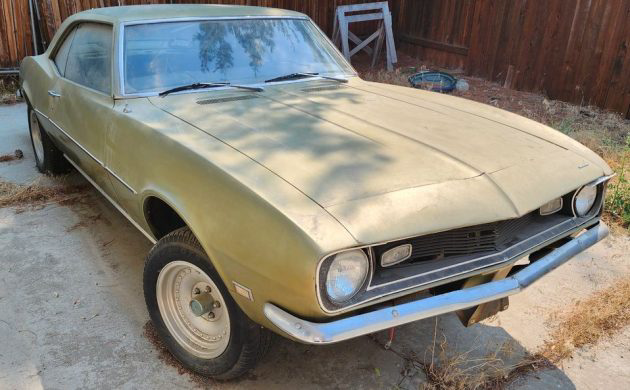
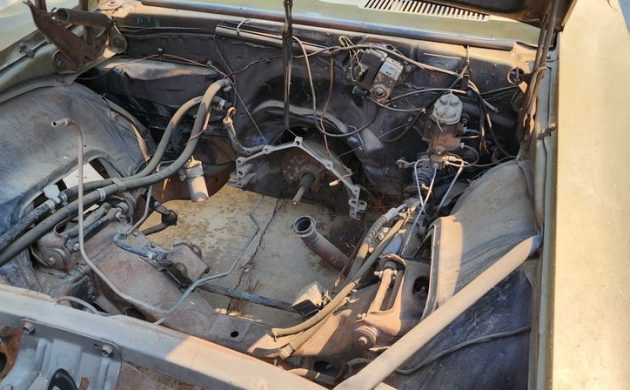
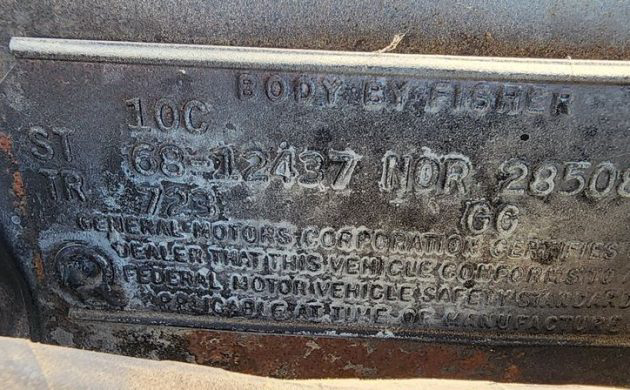
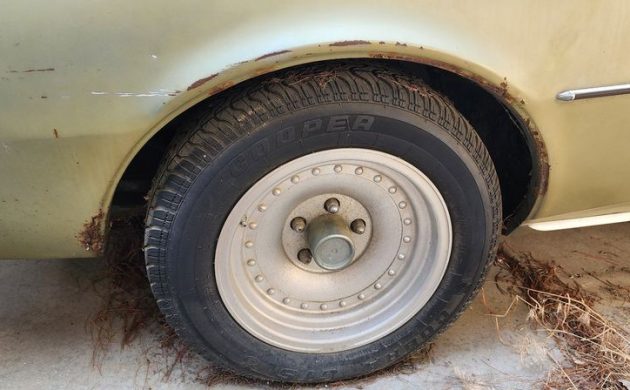
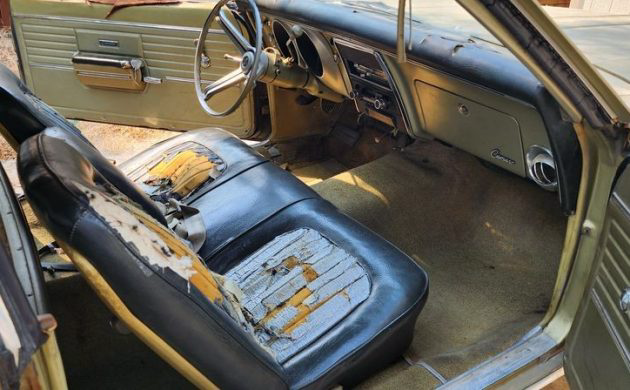
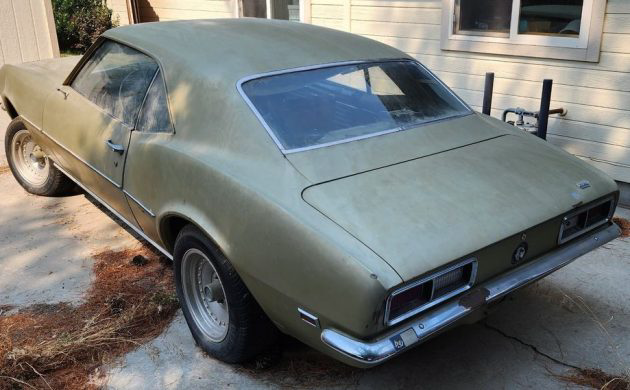






I just think that the seller was told that it had a 6 cylinder, when in fact it was built with an 8 cylinder, that’s all. Cowl tag looks authentic to me.
The seller is playing games, it’s not actually for sale. The ad starts out, “Curious about a price point…may have one for sale, Thought?” My thought. It’s a waste of time. The seller is fishing he thinks he’s clever, but isn’t, far from it. He isn’t even including the engine in his “base price”.
Steve R
This ad is 2 weeks old, if he was serious about selling the car at a reasonable price it would be long gone.
Steve R
Yeah, it has a bench seat, but why is it black?
The main doesn’t match the tail we use to say – it’s not a factory bench seat car….like SR said seller is playing games…..
It IS a factory bench seat car. Decode on firewall trim tag has 723 which translates to green bench seat. I looked it up. You can too by researching trim tag codes for 68 Camaro.
I had a 67 Camaro RS with this same strato-bench seat w/fold-down armrest, w/column shifter, uggh. Was my first car, (used). Strange way to order a Camaro.
Would have much rather had bucket seat custom interior w/console.
Mike, even crazier with column shift & buckets – you could even get a 1st & 2nd gen t/a as such.
Rare options but not terribly desirable options
Rare bench seat even rarer is the no engine option.
Fran, I had an aunt who bought a 1959 Chevy as radio delete, but she was deaf so…. And hers had the 6-cylinder with. 2-speed auto. Fancy sale here, car and engine but not a package deal! Hard pass.
Trim tag 12437 simply designates this as a Camaro coupe. Vin # is where it indicates whether a L6 or V8. 12337 as the first five digits of VIN# means L6, 12437 as the first 5 digits indicates V8. Trim tag on 68 Camaro is notorious for lack of information. The protect-o-plate warranty booklet has the information one really needs to decipher the car. If you don’t have protect-o-plate, you need the even rarer to stumble upon, build sheet which sometimes is found under seats or between gas tank and body.
The trim tag model is the first five digits of the VIN – they’re the same. I’ve lost count of how many ’60s Chevies I have owned, I’m very familiar with their modeling nomenclature and broadcast. It’s the option (lower) portion of the trim tag that is always suspect, and varied by assembly plant – not the model number.
JO
That is not correct. 1968 Camaro did NOT code 6-cylinder on the trim tag.
See my post at the bottom below.
Is this the same guy that had that ’67 big block Corvette, real cheap, that his grandma passed away in, and they never could get the smell out of it? Or has that one been sold?
Nothing seems right about this. I not sure that it even warrants a phone call. (Given how completely nuts Camaro prices are, you couldn’t get one that had been destroyed in a fire, stripped of any usable parts, and then parked in a cow pasture for 25years for what they are asking for this thing)
It’s not a real asking price, $1,234, it basically means call me for a price. This is the same as when a Craigslist ad says $1. It generally either means the seller is fishing for offers or has such a high price no one will bother calling if it was actually shown.
Steve R
That was my point.
Agreed about that price stuff. I belong to a few Facebook Camaro pages. Every so often, someone pops up posting that they have a first Gen Camaro they’re thinking about selling and wondering about car value. There are so many resources out there to use to value a car. I certainly wouldn’t be soliciting opinions of strangers when there is so much out there to help you. An owner should know a car isn’t a blank check. It has a price ceiling. An owner just needs to find that ceiling.
The front seat does not show signs of being dyed so im not sure it goes to this car. Rear folding seat is factory.
Subframe was the same on 6 cylinder and V8 cars (both small and big block) just used different motor mounts. Having previously owned a 68 with a mighty 230 L6, I can attest that if you are restoring an inline 6 car, you build it like it was. If you want to build this car to enjoy and make your heart skip a beat, go V8. 327 or larger.
I luv first and second generation Camaros but not this thing. Crappy bench seat in a Camaro and automatic besides. How bad can it get? Surely nobody is this desperate for a Camaro.
John
723 trim tag comes back as gold bench seat. GG code is for Ash Gold. So this could be the original seat for this car even though the color is wrong. It’s a fairly rare accessory. That being said, it doesn’t make it worth much more. It would be costly to restore the seat but it’s not like you stumbled across a cross ram 302 under the hood.
The wheels are from another manufacturer, they are not authentic Centerlines. There were numerous manufacturers that offered imitation wheels at a lower price point to cash in on the Centerline Auto Drag wheel design. They were typically cast construction with fake rivets, rather than a true 2 piece forged wheel.
Some model years and some plants did code 6-cylinder versus V8 on the trim tags, while others did NOT. ALL 1968 Camaros show the V8 code on the trim tags, regardless of the VIN.
Best to go to the #1 source for all things first-gen Camaro whenever you have a question about one — Camaro Research Group, here: http://www.camaros.org/index.shtml
Go to #’s decode, then to cowl tag decode section, where you will find the following quote regarding the trim tag:
“In 1968-69, the third digit was fixed at “4” for all models (L6 and V8) and had no meaning.”
I posted a link to the Camaro Research Group website, but BarnFinds did not allow it to go through. So Google Camaro Research Group, click Numbers Decode, then click cowl tag decode. PER CRG:
“While the Fisher style code is often confused with the first five digits of the VIN, the two codes are different because of the different meaning of the third digit.
In 1967, the third digit of the style code was set to “4” for standard interior or “6” for custom interior (e.g. a style code for a 67 convertible with custom interior would be 12667).
In 1968-69, the third digit was fixed at “4” for all models (L6 and V8) and had no meaning.”
Rare bench seat. Ha ha .